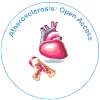MCP-1 Mediated Wound Injury Repair and Activation of Endothelium
Received Date: Sep 01, 2022 / Accepted Date: Sep 23, 2022 / Published Date: Sep 27, 2022
Abstract
Reverse transcription- polymerase chain reaction, RNase protection, Western blot, and flow cytometric analysis showed that human umbilical vein endothelial cells express mRNA and surface protein of the monocyte chemotactic protein-1 (MCP-1) receptor CCR2, which was upregulated by inflammatory cytokines. MCP-1 induced migration of endothelial cells in a transwell assay, which was inhibited by the 9-76 MCP-1 receptor antagonists. Increased secretion of MCP-1 or interleukin-8, but not RANTES, on endothelial injury suggested a functional role of CCR2 in wound repair as measured by ELISA. After mechanical injury to endothelial monolayers, which spontaneously closed within 24 hours, wound repair was delayed by the 9-76 antagonists and by a blocking monoclonal antibody to MCP-1, but not to interleukin-8, and was improved by exogenous MCP-1. This was confirmed by quantification of cell migration into the wound area, whereas proliferation and viability were unaltered by MCP-1 or its analogue. Notably, immunohistochemistry of inflamed tissue revealed CCR2 staining on arterial, venous, and venular endothelium affected by cellular infiltration. This is the first demonstration of endothelial CCR2 expression ex vivo, inferring its involvement in inflammatory conditions. Thus endothelial cells express functional CCR2 that may have important implications for endothelial wound repair and inflammatory reactions.
Citation: Weber K, Nelson P, Grone HJ, Weber C (2022) MCP-1 Mediated Wound Injury Repair and Activation of Endothelium. Atheroscler Open Access 7: 183.
Copyright: © 2022 Weber K, et al. This is an open-access article distributed under the terms of the Creative Commons Attribution License, which permits unrestricted use, distribution, and reproduction in any medium, provided the original author and source are credited.
Share This Article
Open Access Journals
Article Usage
- Total views: 1347
- [From(publication date): 0-2022 - Mar 31, 2025]
- Breakdown by view type
- HTML page views: 989
- PDF downloads: 358
